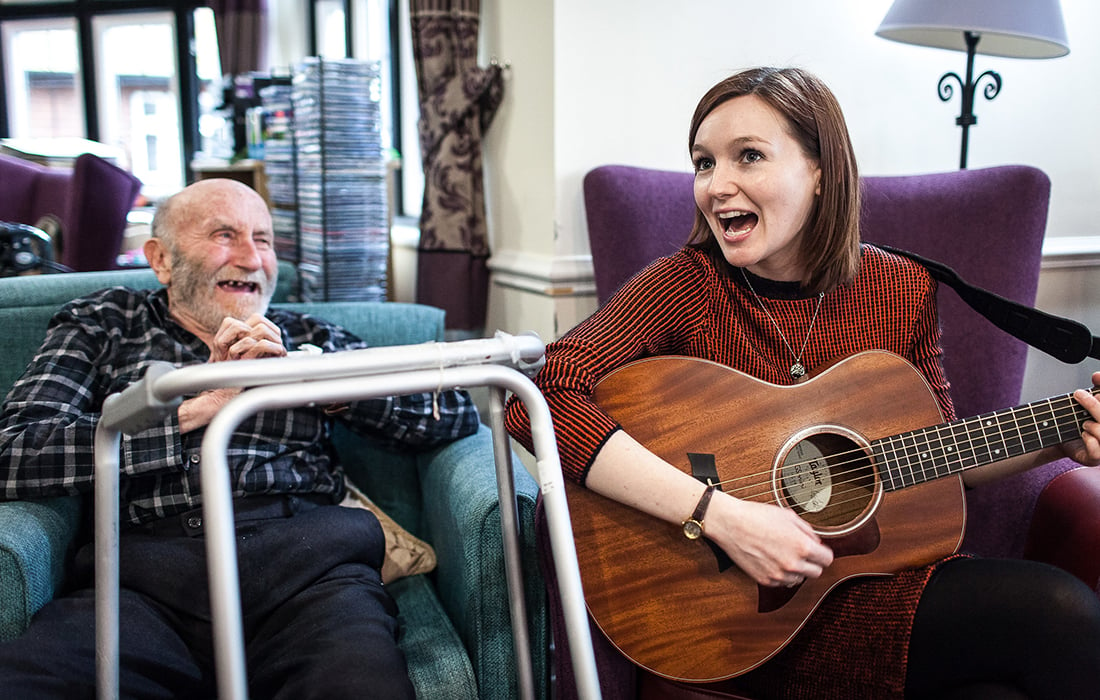
Photo: Live Music Now
Learning from experience with isolated audiences in lockdown
Live Music Now serves audiences in the care and education sectors – but that didn’t stop musicians reaching them while they have been closed to the outside world. Evan Dawson tells the story.
Live Music Now (LMN) was born out of Yehudi Menuhin’s wartime experiences that showed him the transformative power of live music making. The realisation that those who have the least opportunity to experience the benefits and joy of live music need it the most was combined with a desire to support young professional musicians.
Nearly 50 years later LMN now reaches over 80,000 children and older people in over 500 schools and hospitals, care homes and hospices. During this time of national crisis our work is as vital as ever, so despite the numerous hurdles to be surmounted along the way, we were determined there would be no break in the delivery of live music performances to schools that are shut and to care homes that aren’t allowing visitors.
First things first
Our immediate priority was the welfare of our 350 musicians, who are early-career freelancers. LMN is often their main source of income, so our trustees created a new fund to continue paying them regularly until statutory support was available. For many, their financial situation is still extremely difficult but LMN will continue to do whatever it can to support them.
Next, we consulted with hundreds of musicians, care homes, schools, academic and sector experts. One of the themes we kept hearing from the care and education sectors was that social isolation is creating a hidden mental health crisis for older people and for families with children with additional needs. Liz Jones, Policy Director of National Care Forum spoke for many when she said: “At this time of challenge, isolation and crisis in care homes there is more value than ever of bringing the very best live music performances from experienced, highly-talented, professional musicians to the people who live and work in care homes , offering entertainment, relief and connection with the outside world via the use of digital technology.”
It soon became clear that, with creative use of technology, we could deliver meaningful live performances connecting directly to pupils and residents alike. The lack of fast broadband connections or even the possession of computer equipment was sometimes a challenge, but creative people are creative every day and so we quickly found ways to overcome such potential barriers. We are grateful to our funders that they were largely comfortable with letting us “re-purpose” their grants to fund these new ways of delivering performances.
As always, our musicians were overwhelmingly enthusiastic and inventive in proposing new ways of working. Many have been successfully live-streaming concerts for years. Others were less experienced but just as committed to continuing to deliver the work they do year- round.
Sharing and community
One of the most heartening aspects to this crisis has been the way communities have come together. Our musicians reflected this spirit by generously sharing knowledge about platforms, applications and equipment that has enabled others to follow their lead.
LMN has also made freely available its new safeguarding procedures and specific practical guidelines about producing music sessions online for people living with dementia and for children with specific additional needs and disabilities.
Soon our musicians were providing streamed interactive sessions to care homes and families at home; and producing accessible videos designed for specific audiences and some public access.
Our school partners welcomed the idea of bespoke recorded concerts for pupils and their families. Schools like Kingfisher School in Oldham jumped at the opportunity to pilot a series of online music sessions for individual pupils, led by local LMN musician Ben Sayah. Parents, carers and siblings are now able to join in the sessions too, creating music with Ben. He and other musicians in residence have been recording the students' favourite songs and the school has been sending them to the students at home.
New insights
We’ve learnt that online sessions need to be shorter than ones presented in the presence of children and older people and that ambitious multi-screen performances can break the illusion of immediacy created by a more straight-forward approach.
For many audiences (particularly people living with dementia), familiar music can help create trust; but it is still the act of co-creation or discovery that creates a longer-lasting impact. Curiously, by moving into the online space we are no longer limited by geographic boundaries. We have had great responses from Welsh and Irish people living and working in English care homes, for whom we have been able to provide traditional music direct from their childhood countries.
It’s often said that it’s not what happens to us that defines us but how we respond and learn from any given experience. For LMN this crisis has provided us with new insights into the impact music makes and how the rapid and extensive development of remote delivery will remain of great value, especially to those in remote locations.
By connecting musicians and isolated audiences, by innovating the ways in which we work and by being good colleagues across our sector, Live Music Now is still finding how resilient and life-affirming live music is.
Evan Dawson has been Executive Director of Live Music Now since 2013. During this time the charity has delivered over 27,000 music sessions for over half a million older people and children with special educational needs and disabilities, working with over 1,000 professional musicians around the UK. It was a Finalist in the Charity of the Year Awards, and twice a Finalist in the RSPH Health and Wellbeing Awards.
Join the Discussion
You must be logged in to post a comment.